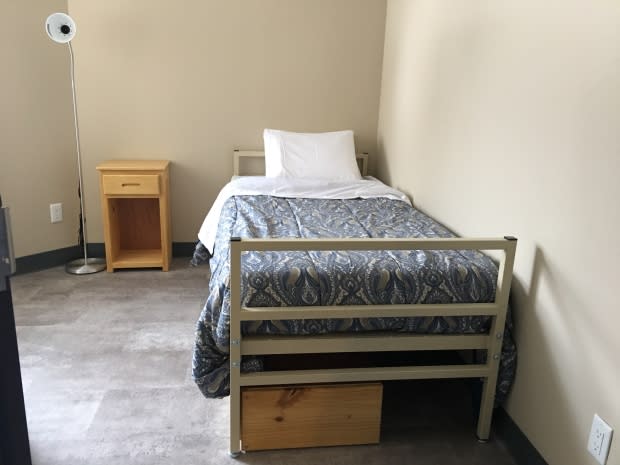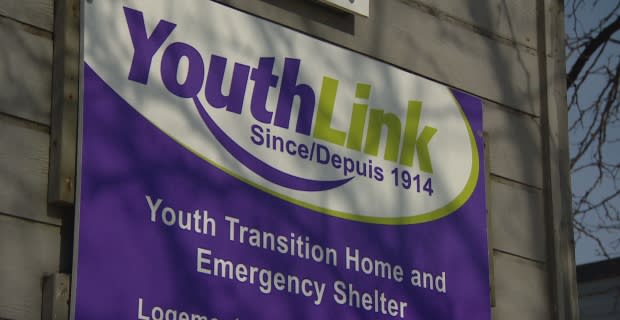New homeless shelter for youth slated to open in March in Scarborough
Evan Back stands in a storage room in a building that will soon be a homeless shelter for young people in Scarborough.
Back points to shelves containing comforters, pillows, sheets and pillow cases. Then he gestures to shelves containing sweatshirts, socks, underwear, and sleeping bags. The room holds much of the bedding and linen that the young people in the building will need.
"We need to have multiples of everything," he says.
In nearby rooms, construction crews are fixing walls and floors. Meanwhile, a Scarborough MPP is coming to the building for a quick tour. It's a busy place and it's only going to get busier.
"What we have done is we have created this shelter. Part of it is an emergency shelter, for those kids who are on the street and need a place to go, and part of it is a transition home," Back, head of fundraising and marketing for YouthLink, told CBC Toronto.

The YouthLink Youth Transition Home and Emergency Shelter, housed in a single storey building under renovation at 747 Warden Ave., north of St. Clair Avenue East, is slated to open on March 15. It's for people aged 16 to 24.
It will have 10 emergency shelter beds and 41 transition long-term beds. It will be a co-ed facility with rooms for couples. YouthLink, a registered charity, is a youth mental health agency in Toronto.
When it opens, the facility will contain Scarborough's only youth homeless emergency shelter. And it will be unique in that it will be the only Toronto youth shelter with a dog kennel, with space for at least six dogs. That means young people on the street can bring their dogs when they come in from the cold.
"It's not just a shelter. It's a combination of shelter and transition home."
Some Ontario shelters are pet friendly, but those facilities are not for young people, Back said.
Young people to get help, dogs to go into kennel
"We've all seen all kinds of young people. They spread a sleeping bag on the street and they're sitting there, and sometimes they're a couple, and they always have dogs. Often those dogs are the only companions that these young people have on this planet. And they will not come in out of the cold, or they will not come in for help, and leave their dog alone," Back said.
"We've created a situation where they can come in, bring their dog with them, and the dog will go into a kennel. And the kids can come and get the help that they need. If they decide to move to the transition side, then what happens is, there'll be a cage put in their room and the kids and dogs can all sleep in the same room."

Back said the facility will be based on a model designed by break the cycle of homelessness. That means there will be individual rooms in the transition home, no dormitories, and residents in the emergency shelter will not be asked to leave first thing in the morning.
'We are looking long into the future for these teenagers'
When some shelters force young people out at the start of the day, they force them back onto the streets, and that increases the chance that they might get into trouble, including prostituting themselves, getting high and committing crimes, he said.
Instead, under the YouthLink model, the homeless young people will be able to use the daytime hours for counselling, drug addiction rehabilitation, life skills lessons, tutoring, schooling and trade skills training. A "revolving door" shelter, he added, solves nothing.
"We are looking long into the future for these teenagers," he said.
"Everything is designed here for the youth to succeed. Private rooms, great facilities, great lounge space, state of the art computer room, really good food, amazing counsellors, all kinds of services coming in and out, great senior management.
"During the day is when the magic happens. It's when the work gets done. It's really, really designed to get these kids well."

Once the young people are assessed, those who are interested will have the opportunity to move from the emergency shelter to the transition home. But those who move but who are not "pulling their weight" will be asked to leave. "We can't babysit," he said.
Over 1,000 youth believed homeless in Scarborough
It's estimated that there are more 1,000 homeless young people in Scarborough. "There is a lineup already," he said. "In Scarborough, we're the only game in town. We should build three of these."
Back said the building, owned by YouthLink, was once a mechanic's shop. It is a labyrinth, with the shelter side connected to the transition side through a series of hallways. An open air courtyard is in the middle of the building.
The shelter will contain an intake room, a "debugging" room where belongings will be sprayed to kill bugs, showers, a laundry room, lounge, library, and three kitchens. No drugs will be allowed on the premises.
Renovations, being paid for by the city, are costing $1.5 million. The kennel itself costs $50,000. Back has raised $30,000 for the kennel but is $20,000 short. There is no funding for dog food, vet bills and feminine hygiene products. Back has launched a GoFundMe page to raise money for the kennel.
"We just want to open our doors to any teenager who is in trouble who wants help and who is ready to do the work to get better."

MPP Aris Babikian, who represents Scarborough-Agincourt for the Progressive Conservatives, said during his tour that the shelter will make a difference.
"It is very impressive and there is a need for it. I'm glad that at least there is a centre where the youth can go and seek help," he said.
Babikian told Back: "I'm sure down the road we will work together. I will try to help you as much I can. Our government is committed to mental health issues and the youth portion is very important."
YouthLink was originally the Big Sisters of Metropolitan Toronto.

